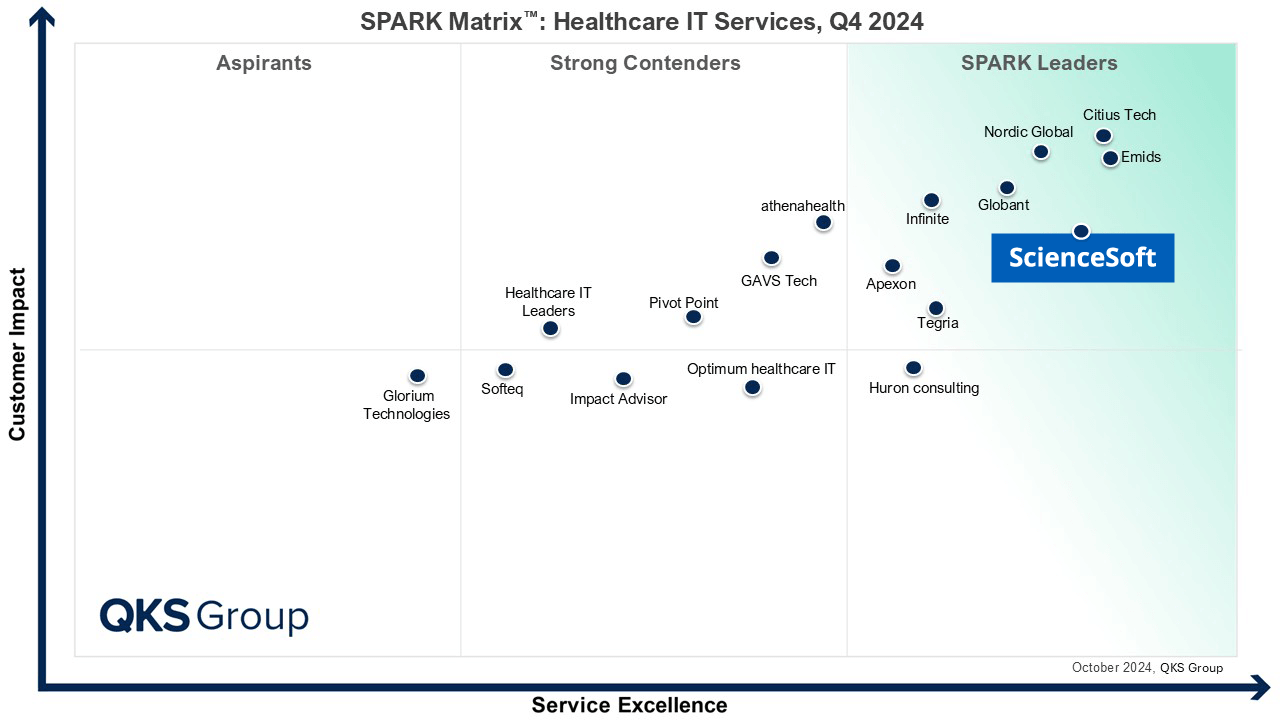Healthcare Data Warehouse
Turn Healthcare Data into Valuable Insights
In healthcare IT since 2005, ScienceSoft devises digital pathways to make data handling easier and faster. Providing a full range of data warehousing services, ScienceSoft helps healthcare organizations and companies build robust data warehouses from scratch or enhance their existing systems.
Data Warehouse in Healthcare: the Fundamentals
A healthcare data warehouse is a centralized repository for healthcare organization’s data retrieved from disparate sources, processed and structured for analytical querying and reporting. A DWH can help improve clinical outcomes, optimize staff management and procurement, reduce operating costs.
Compared to a regular database, an enterprise data warehouse (EDW) consolidates data not from one source but from multiple healthcare IT systems (e.g., EHR, CRM, patient portal). The main purpose of a DWH is not to simply store raw data, but to keep it in a structured format for further analysis. A healthcare data warehouse can be integrated with a data lake, ML, and BI software.
Implementation costs for a healthcare DWH start from $70,000 for a small healthcare provider and may reach $1,000,000 for a complex technology-rich solution for a large company. Use our online calculator to estimate the cost for your case.
Healthcare Data Warehouse Solution Architecture
ScienceSoft creates enterprise data warehouses, which become a central component of a healthcare BI solution comprising the following elements:
- Data source layer – healthcare data from internal and external data sources (ERP, EHR/EMR, CRM, claims management system, pharmacy management systems, etc.).
- Staging area – intermediate temporary storage, where healthcare data undergoes the extract, transform and load (ETL) or the extract, load and transform (ELT) process.
- Data storage layer – includes centralized structured storage. It may also have data marts – healthcare DWH subsets oriented to a specific business line (HR, accounting, etc.) or department (radiology, intensive care, pediatrics, etc.).
- Analytics and BI – business analytics, data mining, data reporting and visualization tools.

Key Features to Look for in the Healthcare DWH
The functionality of medical data warehouse solutions ScienceSoft delivers differs from client to client. Here, we’ve outlined the features commonly requested by healthcare organizations we work with:
The healthcare clients I work with agree that analysis of various information consolidated in a data warehouse provides important insights, especially for value-based care model. In my projects, I suggest using a DWH to measure patient outcomes (based on length of hospital stay, readmissions, etc.), care costs (e.g., used resources, medical staff time), and assess the care value.
Valuable Integrations for a Healthcare DWH
To maximize the value and cost-efficiency, ScienceSoft recommends setting up the following integrations for enterprise data warehouse in healthcare:

Enables training ML models on structured healthcare data from the clinical data warehouse. ML-powered analytics helps predict clinical outcomes, deliver personalized care, analyze medical images, make informed business decisions, and more.
Enables visualization of data stored in DWH, automated reporting (hospital annual report, average hospital stay report, etc.), and creates interactive dashboards (with patient demographics data, insurance claims, etc.).
Healthcare Data Warehouse Investments
The cost of healthcare data warehouse implementation ranges from $70,000 to $1,000,000 depending on the project scope. Based on ScienceSoft’s experience in medical DWH implementation, the approximate timeframes are from 3 to 12 months.
Healthcare data warehouse key cost drivers:
- Number of healthcare data sources (ERP, EHR/EMR, CRM, claims management system, pharmacy management systems, etc.).
- Healthcare data disparity (for example, difference in data structure, format, and use of values) across various source systems.
- Complexity of healthcare data (for example, big data, streaming data).
- Volume of healthcare data to be processed.
- Healthcare data security requirements.
- Number of healthcare data tables and columns used for analysis.
- Healthcare data warehouse performance requirements (velocity, scalability, fault tolerance, etc.).
Here is the pricing for healthcare organizations of different size:
$70,000 – $200,000*
For companies with 200 – 500 employees.
$200,000 – $400,000*
For companies with 500 – 1,000 employees.
$400,000 – $1,000,000*
For companies with more than 1,000 employees.
*Monthly software license fee and other regular fees are NOT included.
Ballpark timelines for each stage of healthcare data warehouse implementation
A typical ScienceSoft's project on healthcare data warehouse software implementation covers the following stages and timelines:
- Healthcare data warehouse goals elicitation: 3-20 days.
- Healthcare data warehouse solution conceptualization and tech stack selection: 2-15 days.
- Business case and project roadmap creation: 2-15 days.
- System analysis and healthcare data warehouse architecture design: from 15 days.
- Healthcare data warehouse solution development and stabilization: from 2 months.
- Healthcare data warehouse solution launch: from 2 days.
- After-launch support, maintenance, and evolution: as requested.
Hide
Healthcare DWH Financial Benefits and Success Factors
Relying on 20+ years of experience in healthcare IT and DWH implementation, ScienceSoft helps consolidate disparate data into a structured repository to achieve:
|
|
Improved care outcomes. In our project catering to 200 US healthcare facilities, implementation of a DWH with BI reports (e.g., on missed medications, hospital readmissions) helped providers to timely spot the issues in care processes and resolve them. |
|
|
Optimized staff management due to advanced analytics of employee schedules, recruitment needs, etc., and data-driven HR decisions. |
|
|
Decreased healthcare operating costs due to informed business and clinical decision-making. |
|
|
Optimized healthcare asset management. When ScienceSoft implemented a DWH and BI functionality for a provider of diagnostic imaging services, the Client started tracking the efficiency of its services, streamlined its operations, optimized business processes. It resulted in quicker response time, improved staff productivity, enhanced customer experience. |
|
|
Improved patient retention due to personalized care delivery and better patient experience. |
In data warehousing since 2005, ScienceSoft’s seasoned IT consultants have defined the set of factors that can help maximize the ROI for DWH projects.
Healthcare DWH scalability and flexibility
If the amount of data you store is likely to increase, you need a scalable DWH solution to instantly upload any type (structured, semi-structured, unstructured) and volume of healthcare-related data.
Security and data protection measures
To ensure full security of the patient data stored in the DWH, you need to employ robust cybersecurity measures (e.g., data encryption, MFA), and conduct regular checkups such as vulnerability assessment and pentesting.
Well-established data quality management
Conduct a comprehensive DWH system analysis and design future-proof data governance practices before collecting data from diverse sources. It will help avoid common issues like different encoding formats, conflicting key fields, etc.
Key Steps for a Healthcare DWH Implementation
1. Data warehouse feasibility study to assess project viability with respect to business objectives and user needs.
2. Discovery phase to elicit and analyze high-level data warehouse requirements.
3. Data warehouse conceptualization and platform selection considering the number of data flows, security requirements, etc.
4. Project planning to define project timeframes, milestones, deliverables, risk management strategy, costs and TCO.
5. Healthcare data warehouse architecture design.
6. Development and stabilization of a medical DWH.
7. Data warehouse launch.
8. Healthcare data warehouse support and evolution throughout the DWH solution lifetime.
Professional Services for Healthcare DWH Development
Since 2005, ScienceSoft has been offering medical IT solutions and providing a full range of data warehousing services. Our robust DWHs integrate various types of medical data and support the decision makers with high-quality healthcare insights. With established project management practices, we make it our #1 priority to drive projects to their goals regardless of time and budget constraints.
Our awards, recognitions, and certifications

Featured among Healthcare IT Services Leaders in the 2022 and 2024 SPARK Matrix
Recognized for Healthcare Technology Leadership by Frost & Sullivan in 2023 and 2025
Named among America’s Fastest-Growing Companies by Financial Times, 4 years in a row

Top Healthcare IT Developer and Advisor by Black Book™ survey 2023
Recognized by Health Tech Newspaper awards for the third time (2022, 2023, 2025)

Named to The Healthcare Technology Report’s Top 25 Healthcare Software Companies of 2025

HIMSS Gold member advancing digital healthcare
ISO 13485-certified quality management system
ISO 27001-certified security management system
DWH Vendors ScienceSoft Recommends for Healthcare
When listing the healthcare data warehouse vendors, we drew on our 20 years of experience in DWH and considered reputable rankings like Gartner’s Magic Quadrant and Forrester’s Wave. Here are the vendors suitable for midsize and large healthcare organizations:

Amazon Redshift
Best for: big data warehousing
Features
- Integration of all healthcare data types (structured, semi-structured, unstructured) for storing and SQL-querying.
- Integrations with the AWS ecosystem (including S3, AWS Glue, Amazon EMR) and third-party tools (Power BI, Tableau, Informatica, Qlik, Talend Cloud).
- Federated queries support.
- ML capabilities for optimized performance under varying workloads.
- Separate scaling of compute and storage.
- Healthcare data encryption and fine-grained access control.
- HIPAA-compliant.
Pricing
- On-demand pricing – $0.25 – $13.04/hour.
- Reserved instance pricing offers saving up to 75% over the on-demand option (a 3-year term).
- Data storage (RA3 node types): $0.024/GB/month.
Azure Synapse Analytics
Best for: advanced data analysis
Features
- SQL-querying of structured, semi-structured, unstructured healthcare data.
- Native integrations with a data lake, operational databases, BI and ML software.
- Integration with third-party BI tools, including Tableau, SAS, Qlik, etc.
- Separate billing for compute and storage.
- Healthcare data encryption, dynamic healthcare data masking, column- and row-level security.
- HIPAA-compliant.
Pricing
- Compute on-demand pricing – $1.20–$360/hour.
- Compute reserved instance pricing allows saving up to 65% over the on-demand option (a 3-year term).
- Data storage: $122.88/TB/month.
Oracle Autonomous Data Warehouse
Best for: hybrid healthcare DWHs
Features
- Querying across multiple healthcare data types (structured, semi-structured, unstructured).
- Built-in connectivity to Oracle Cloud Infrastructure Object Storage, Azure Blob Storage, Amazon S3.
- Integration with Oracle Analytics Desktop and third-party BI tools (Microsoft Power BI, Tableau, MicroStrategy, Qlik, etc.).
- Healthcare data encryption, privileged user and multifactor access control.
- Independent scaling of storage and compute.
- HIPAA-compliant.
Pricing
- Compute costs: $1.3441/CPU/hour
- Data storage: $118.40/TB/mo (in the public cloud).
About ScienceSoft
ScienceSoft is a global IT consulting and software development vendor with offices in the US, the UAE, and Europe. With 150+ successful healthcare IT projects, we provide a full range of data warehousing services. Being ISO 13485-certified, ScienceSoft designs, develops, and tests high-quality medical IT solutions according to the requirements of the FDA and the Council of the European Union. We rely on mature quality and security management systems to guarantee our clients’ satisfaction with project outcomes and complete safety of their data.





